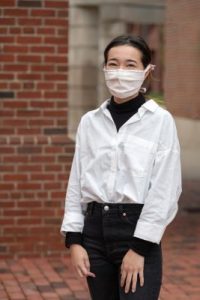When students hired for the Syracuse University COVID-19 contact tracing team did not have many contacts to trace, they nimbly and creatively morphed into what student supervisor Taylor Spires calls the “COVID response team.”

Led by Adam “AJ” Florkowski, operations program manager for the Institute for Veterans and Military Families and a member of the COVID-19 Project Management Office, the team of nearly 50 students is also involved with testing, lab processing, case evaluations, quarantine protocols, scheduling and managing, and even collecting wastewater that’s tested for the coronavirus.
“We all signed up to be contact tracers, but 90 percent of us haven’t had to do much of that,” Spires says. “We’re all doing a little bit of everything, and we’re having fun with that. We love working with each other and the administration has been very helpful working with us.”
Florkowski says the original plan was to hire 20 students in July to serve at contact tracers who would help identify and collect information from students who may have been in contact with an infected person. But as students returned to campus in early August, testing ramped up and help was needed to run lab tests and perform other necessary duties.
Florkowski, the response team’s supervisor, is a U.S. Army lieutenant colonel who spent 21 years in the service—nearly 12 on active duty as an engineer officer from 1999-2010, and the last 10 in the Army Reserves. From this March through July, he was mobilized through the Army Reserves to support the Federal Emergency Management Agency (FEMA) response in New York State.
FEMA was the lead agency for the response and each state has a team of Emergency Planning Liaison Officers (EPLO) that support FEMA. Florkowski is an EPLO who worked hand in hand with FEMA and the New York State National Guard.
That experience prepared Florkowski to help lead the university’s response efforts. What he did not anticipate at the start of the response was that the group of students he was supposed to supervise as contact tracers would so eagerly pivot to fill other positions that were critical to the response.
“They’re doing it because they want to make a difference,” Florkowski says. “They talked about coming back to SU and making it through the semester, and these guys want to be part of the solution that helps everybody get there.”
